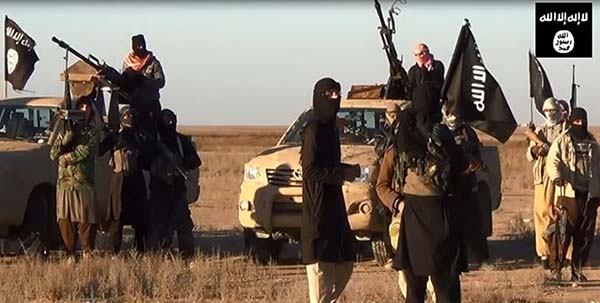The dot points below summarize long-term outcomes of the battle against ISIS in Iraq.
- Long Term declines and death of ISIS is certain. Under President Obamas leadership all the important regional powers (Egypt, Jordan, Lebanon, Saudi Arabia) have signed up to strike ISIS (12 Sep, The Guardian). Iranian military is also fighting ISIS (26 August, The Dailybeast). This broad network of regional powers ganging up on ISIS means its long-term military defeat and political decline is certain. No regional power is willing to support them in the long term.
- An inclusive Iraqi Government is essential before taking on ISIS militarily. The aim is to weaken the Iraqi Sunni political support for ISIS insurgency. With a new leadership team headed by Prime Minister Heidar Al-Abadi running the Iraqi Government (8 September, The Independent) diplomatic efforts of the Obama Administration has been productive in this area.
- Defeating an insurgency from the air alone is not possible. Therefore a reinvigorated Iraqi army will be an essential component of the fight against ISIS. The new Prime Minister of Iraq is committed to reinvigorating the Iraqi Army. Western military advisors, air power and expanded intelligence work will be playing a secondary role in the achievement of long term security results on the ground.
- The Peshmarga forces of Kurdistan Regional Government will play an important role by supplementing the ground offensives of the Iraqi Army. The Obama Administration and France have been supplying the Peshmarga with military hardware to shore up their fighting strength (14 August, TurkishPress.com). For maximum operational effect the Peshmarga and Iraqi Army will need to coordinate their offensive battles against ISIS.
- Expanding military strength of the Kurdish Peshmarga is not ideal for Baghdad or Washington. The policies of their respective governments is do keep Iraq a politically united country. Due to its upgraded military muscle a more assertive Kurdish Regional Government will emerge after the fight against ISIS is over.
If unchecked by Washington or Baghdad this assertiveness will in the long run accelerate the Iraqi Kurdish independence goals.
The economic infrastructure and resources the Peshmarga will capture from ISIS will only make this prospect far more robust.
The capture of oil fields in city of Kirkuk early in June this year (13 June, The Guardian) is the first step in progress toward Kurdish economic independence. An expanded Kurdish economic zone makes declaration of a future independence state financially viable. In the long run this outcome does not contribute toward creation of a politically united Iraq. - For security gains in Iraq to be durable the Iraqi Government and Kurdish Peshmarga will have to permanently hold the territory they capture from ISIS. Especially after the Western air campaign stops. For this to happen the Iraqi Army will need successfully transform itself into a coherent fighting machine. How successfully the new Iraqi Prime Minister Heidar Al-Abadi will be at doing this will reflect strength of his leadership.
- The Iraqi Government will need to consolidate its military gains in the areas it has captured by providing essential services to the population centers.
- Strength of Iraqi Governance in captured areas will be an important indicator of its ability to hold the territory for the long term. Unless Baghdad can provide clean, efficient, honest, secure and inclusive governance to the population centers it has captured its consolidation of those areas will be not be complete.
- Then the Iraqi army can attack the next t ISIS stronghold and repeat the consolidation process there. Here too the western and regional military intervention will play a secondary role. The bulk of fighting on the grounds needs to be done by the Iraqi army and the Kurdish Peshmarga.
- To capture and consolidate all of Iraqi ground under ISIS control the Iraqi Government will need more money and resources than it has at its disposal. The extra resources can come from two sources. First the western and regional powers can either organize a financial aid package to Iraq. Second the Iraqi Government can extract more oil from the ground in order to pay for its war against ISIS.
- Even after removal of ISIS in Iraq the Government of Iraq will remain a fragile and vulnerable one. There is no coherent cultural identity due to tribal nature of society there. It is a country permanently divided against itself. In political terms that means there will be no perfect system of government for Iraq, no perfect long term political stability.
- Due to point 11 after the campaign against ISIS the most optimist scenario the regional and western powers can hope for is an inherently imperfect and fragile Iraq will emerge in the end that can hold itself together economically, militarily and remain politically united.
- Due to the long term political vulnerability highlighted in dot point number 11 even after complete removal of ISIS in Iraq stable regional powers will have a strong degree of influence over the government and fate of the country.
This vulnerability is exacerbated by emergence of a more robust Kurdistan Regional Government in the end of the ISIS campaign.
The degree of influence each regional player will enjoy will be directly proportional to how much resource they are willing to commit to supporting their interests in the country, alone or in coalition with other powers.

